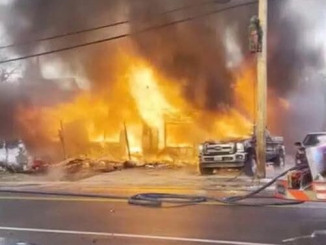
They never called me by my name.
Just “you.”
For ten years.
But the night their daughter was dying…
When no one else in the family could save her…
They turned to the girl in the back.
The one who scrubbed their floors.
Washed their clothes.
Slept next to buckets.
And cried silently.
That night in the hospital, they didn’t need a maid.
They needed me.
I was 15 when I arrived at the Okonjo Home in Ikoyi.
Big doors. Strict rules.
Burly people who barely looked at me.
“Don’t touch anything in the refrigerator.”
“Don’t talk when the lady is standing.” “Don’t call Ogechi your companion; she’s the daughter. You’re the help.”
So I stayed small.
I stayed silent.
I became invisible.
I watched the years go by like dishwater down the sink.
Five birthdays, none of them mine.
Four Christmases, no presents.
My first rule: I secretly used balled-up tissues.
My father died, so I wasn’t allowed to go home.
One night, Madam laughed with her friends:
“She’s so quiet. Like the furniture.”
I smiled.
Because even furniture gets dusted sometimes.
There was one light in that house: Uhu.
The little one.
She was born with sickle cell anemia.
Always weak. Always in pain.
But she would reach out to me and whisper:
“Auntie Shade, please don’t leave me.”
I never did.
I held her when she trembled.
I sang to her when her fever rose. I prayed like a mother, even though no one called me that.
One Tuesday morning, she collapsed.
She was rushed to the hospital.
“Serious crisis. Needs blood immediately. O negative.”
The calls came in.
Uncles. Aunts. Neighbors. Friends.
There was no match.
I stepped forward.
“I’m O negative.”
They looked at me as if I’d spoken another language.
“You? Are you sure?”
The doctor turned to me:
“Name?”
I looked him straight in the eyes and said:
“Shade Olawale. 25. Healthy. Ready.”
They drew my blood.
Uju survived.
Later, the doctor told them:
“If you hadn’t come forward, your daughter wouldn’t have survived.”
The woman came to me.
Hands trembling. Eyes filled with tears.
She took my hand.
“Thank you…”
“…Shade.”
My name.
After ten years. Finally.
After that night, things changed.
They gave me a real room.
They enrolled me in night classes.
They started saying “please” when they sent me on errands.
Even Ogechi, the one who once laughed at my worn-out slippers, hugged me.
“You saved Uju. You’re not just our maid. You’re our angel.”
But I didn’t feel like an angel.
Just a woman finally making herself known.
One night, Uju asked me:
“Now that I’m better… will you leave us?”
I nodded.
“Yes. It’s time to live for myself.”
They cried.
They offered me things: a car, a beauty salon, an apartment.
But I said:
“I don’t want to be someone who’s only remembered in an emergency.
I want a life where things matter… even when no one is suffering.”
I left with 50,000 ₦ and my peace.
I got a small place.
I enrolled in hospitality school.
I started a food delivery business: Shade’s Spoon.
Within three years, I was delivering food to six different food banks.
Uju called often.
Sometimes she cried.
“No one has taken care of me like you.”
Ten years later, she launched a wellness foundation.
She invited me to join her.
On stage, in front of the cameras and spotlights, she said:
“This is the woman who not only kept me alive, but taught me how to live.”
There she was, in heels.
In a gold dress.
With a microphone that no longer trembled.
And I said:
“They used to call me ‘you.’
Now they call me Mom.”
💭 Sometimes, you will serve in silence for years…
Until your blood speaks louder than your name.
Perhaps they will forget your kindness,
Until I save them.
But give anyway.
Because heaven never forgets.
💔 Part 2 — “They didn’t know that when I saved their daughter… I was also saving mine.”
Weeks passed since that night in the hospital.
Everyone treated me differently.
I was no longer just the maid.
I was Shade. I was the woman who had saved Uju.
And yet… something inside me didn’t feel at peace.
One afternoon, I went to the hospital to pick up my post-donation results.
It was a routine procedure, I thought.
But the nurse who attended to me looked at me intently.
She checked my papers. Then she asked me to wait.
She came back with a doctor.
“Shade Olawale?” he asked.
“Yes,” I replied.
“Can we talk in private?”
We entered a small office. The doctor closed the door.
His face was serious, almost tense.
“You see, we did a special cross-match because of the girl’s history of sickle cell anemia. A genetic compatibility test. It’s a rare protocol… but important.”
I crossed my arms, not understanding.
“So…?”
He looked me straight in the eyes.
“Blood doesn’t lie, Mrs. Olawale. Uju isn’t just a match for you. Genetically, she’s your daughter.”
My mind shut down.
All sound became distant.
I sat down without realizing it.
“What… what are you saying?” I murmured. “That can’t be. I… I don’t have children.”
“Are you sure?”
I opened my mouth… but I didn’t know what to say.
And then






Leave a Reply